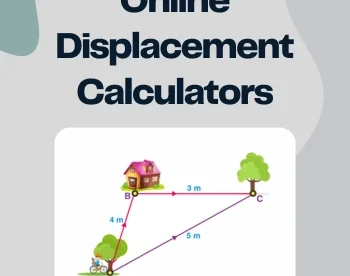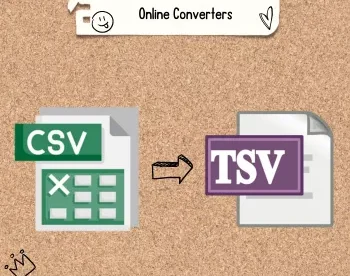6 Best Free Online PPM to Hz Calculator Websites
Here is a list of the best free online PPM to Hz Calculator websites. PPM is short for Parts Per Million where Hz is Hertz. Both terms are used to measure the frequency. PPM is often used to specify the frequency in a crystal oscillator. PPB (Parts Per Billion) is also used for high-quality crystal ovens. But Hertz is a common term and thus easy to understand in terms of frequency. You can use the following formula for PPM to Hz conversion:
Frequency difference (Hz) = PPM x Reference frequency / 1,000,000
Alternatively, you can use an online tool to do the same more quickly and accurately. This post covers 6 free websites where you can convert stability frequency from PPM to Hz. All these websites offer simple conversion calculators where you have to provide the PPM and reference Frequency. From that, the calculators give you the converted frequency in Hz.
My Favorite Online PPM to Hz Calculator
As all these calculators are based on the same formula, there are not any measure differences among them. I prefer SiTime.com as it has a nice and clean layout and calculates freeway various along with Max-Min Period. And, it also offers another calculator to convert Hz to PPM.
You can check out our other lists of the best free online RLC Resonant Frequency Calculator websites, online Resistivity Calculator websites, and online Log Graphing Calculator services.
Comparison Table:
| Name | PPM to Hz | Frequency Range | Variation |
|---|---|---|---|
| SiTime.com | ✓ | ✓ | ✓ |
| 5G-Tools.com | ✓ | ✓ | ✓ |
| EverythingRF.com | ✓ | ✓ | x |
| RFWireless-World.com | ✓ | x | x |
| HyperElectronic.net | ✓ | ✓ | ✓ |
| Changpuak.ch | ✓ | ✓ | ✓ |
SiTime.com
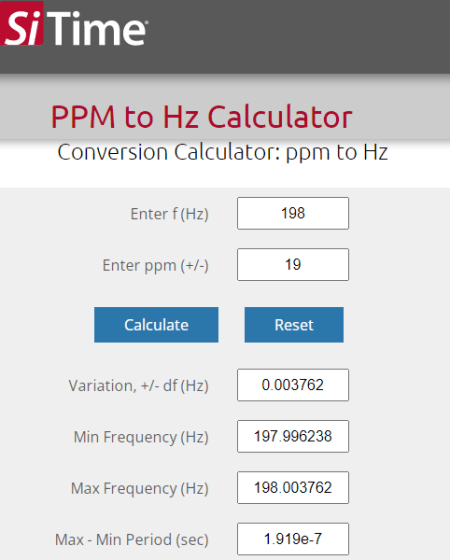
SiTime.com has a free online conversion calculator to calculate PPM to Hz. The web page starts with a brief explanation of the term followed by the formula. Below that you get the actual calculator. The calculator has two input fields for Frequency and PPM. You can add the values and run the calculation. The results get you Variation, Min Frequency, Max Frequency, and Max-Min Period. This way, you can use this calculator to convert PPM frequency to Hz.
Highlights:
- This calculator finds Min Frequency, Max Frequency, Max-Min Period, and Variation.
- It briefly explains the term with the help of the formula used.
- It also offers another calculator to convert Hz to PPM.
5G-Tools.com
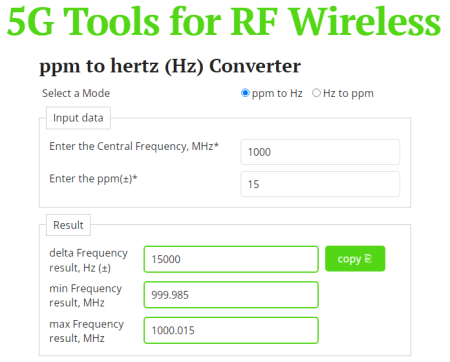
5G-Tools.com offers a PPM to Hz Converter that you can use to convert the PPM to Hz and vice versa. The conversion calculator has a neat interface with an option to select the conversion type at the top. You can pick the “PPM to Hz” mode from there. After that, you can add your input data. This includes the Central Frequency (in MHz) and PPM. With that, you can run the calculation. This gets you the Delta Frequency, Minimum Frequency, and Maximum Frequency in the results.
Highlights:
- This calculator can convert PPM to Hz and vice versa.
- It also calculates frequency range and variation.
EverythingRF.com
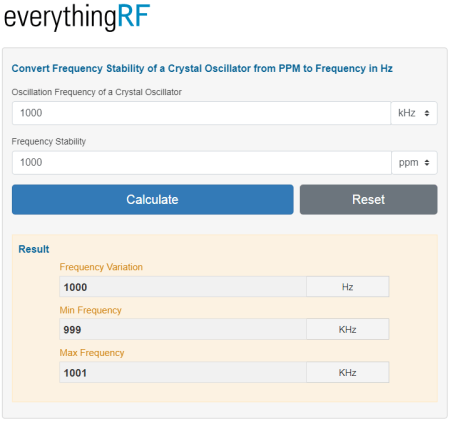
EverythingRF.com is a website with a collection of tools, calculators, and products related to Radio Frequency. It has a free online PPM to Hz Calculator. You can use this calculator to convert the Frequency Stability of a Crystal Oscillator from PPM to Frequency in Hz. To do that, you get a simple interface that asks for the Oscillation Frequency of a Crystal Oscillator and Frequency Stability. You have to select the right unit and then add your input data. Based on that, the calculator gets you the Frequency Variation, Min Frequency, and Max Frequency.
Highlights:
- This calculator calculates Frequency Variation, Min Frequency, and Max Frequency from PPM.
- It also shows the formula for this calculation.
RFWireless-World.com
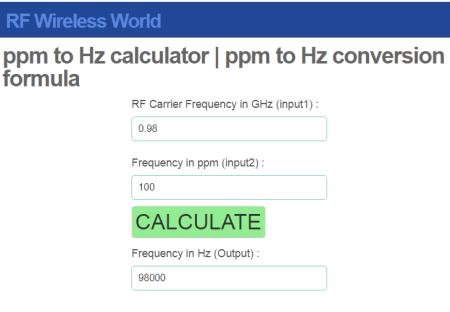
RFWireless-World.com is a free website where you can calculate PPM to Hz online. It has a simple calculator for this conversion. The calculator does the conversion of the PPM value to Frequency in Hz. To perform the calculation you have to provide two inputs. The first input is RF Carrier Frequency in GHz and the second input is Frequency in PPM. After that, when you run the calculator, it shows the Frequency in Hz. It does not calculate minimum or maximum frequencies or any variation. But it does cover the formula used.
Highlights:
This calculator only gives the frequency (Hz) in the output.
HyperElectronic.net
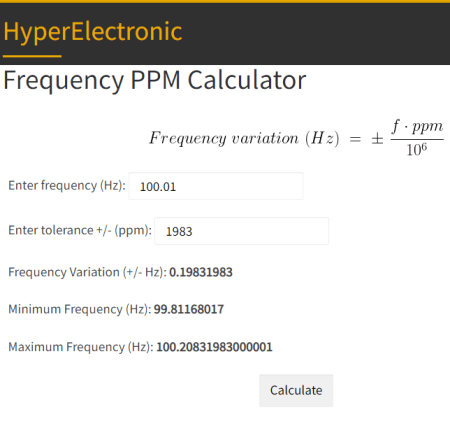
HyperElectronic.net is another website where you can calculate PPM to Hz online. It offers a simple calculator that calculates frequency range and variation. It lists five sections together with a calculate button at the bottom. You have to add the first two values which include Frequency and PPM. Then you can click the calculate button to get the values of Frequency Variation, Min Frequency, and Max Frequency. Apart from that, the web page also includes the formula of the calculation and provides a brief explanation.
Highlights:
- This calculator calculates Frequency Variation, Min Frequency, and Max Frequency.
- It also covers the formula with a brief explanation.
Changpuak.ch
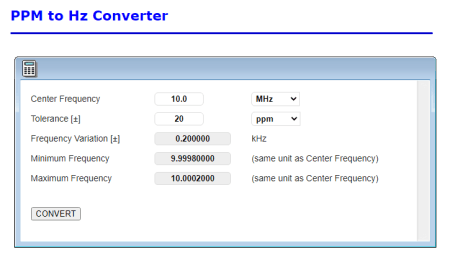
Changpuak.ch is a free website with a PPM to Hz Converter. It is a simple conversion calculator that can help you convert the frequency stability of a crystal oscillator from Parts Per Million (PPM) to Hertz (Hz). To perform the conversion, you have to add the Center Frequency and Tolerance. You can add the Center Frequency value in GHz, MHz, or kHz. Similarly, you can add the Tolerance in PPM or PPB. Then you can click the Convert button to perform the conversion. This gets you Frequency Variation, Minimum Frequency, and Maximum Frequency.
Highlights:
- This tool converts PPM/PPB to Hz.
- It also calculates frequency range and variation.
Frequently Asked Questions
In frequency, PPM (parts per million) is a unit used to express the difference between two frequencies. It represents the ratio of the difference between the two frequencies to the frequency of the reference signal, multiplied by one million.
PPM (parts per million) is a unit used to express small quantities of a substance in a larger amount. To convert PPM to Hz (Hertz), you need to know the frequency of the reference signal and multiply it by the PPM value divided by one million.
To convert Hz (Hertz) to PPM (parts per million), you need to know the frequency of the reference signal and the frequency of the signal being measured. Then, subtract the frequency of the measured signal from the frequency of the reference signal, divide by the frequency of the reference signal, and multiply by one million.
The number of Hz represented by 1 PPM (parts per million) depends on the frequency of the reference signal. For example, if the reference frequency is 1 GHz (1,000,000,000 Hz), then 1 PPM would be equivalent to 1,000 Hz. However, if the reference frequency is 100 MHz (100,000,000 Hz), then 1 PPM would be equivalent to 100 Hz.
About Us
We are the team behind some of the most popular tech blogs, like: I LoveFree Software and Windows 8 Freeware.
More About UsArchives
- May 2024
- April 2024
- March 2024
- February 2024
- January 2024
- December 2023
- November 2023
- October 2023
- September 2023
- August 2023
- July 2023
- June 2023
- May 2023
- April 2023
- March 2023
- February 2023
- January 2023
- December 2022
- November 2022
- October 2022
- September 2022
- August 2022
- July 2022
- June 2022
- May 2022
- April 2022
- March 2022
- February 2022
- January 2022
- December 2021
- November 2021
- October 2021
- September 2021
- August 2021
- July 2021
- June 2021
- May 2021
- April 2021
- March 2021
- February 2021
- January 2021
- December 2020
- November 2020
- October 2020
- September 2020
- August 2020
- July 2020
- June 2020
- May 2020
- April 2020
- March 2020
- February 2020
- January 2020
- December 2019
- November 2019
- October 2019
- September 2019
- August 2019
- July 2019
- June 2019
- May 2019
- April 2019
- March 2019
- February 2019
- January 2019
- December 2018
- November 2018
- October 2018
- September 2018
- August 2018
- July 2018
- June 2018
- May 2018
- April 2018
- March 2018
- February 2018
- January 2018
- December 2017
- November 2017
- October 2017
- September 2017
- August 2017
- July 2017
- June 2017
- May 2017
- April 2017
- March 2017
- February 2017
- January 2017
- December 2016
- November 2016
- October 2016
- September 2016
- August 2016
- July 2016
- June 2016
- May 2016
- April 2016
- March 2016
- February 2016
- January 2016
- December 2015
- November 2015
- October 2015
- September 2015
- August 2015
- July 2015
- June 2015
- May 2015
- April 2015
- March 2015
- February 2015
- January 2015
- December 2014
- November 2014
- October 2014
- September 2014
- August 2014
- July 2014
- June 2014
- May 2014
- April 2014
- March 2014

